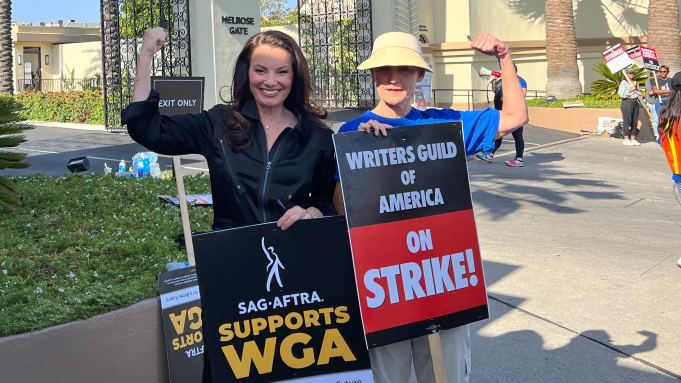SAG-AFTRA Joins WGA On Picket Line: Hollywood Faces Historic Strike

Table of Contents
The Reasons Behind the SAG-AFTRA Strike
The SAG-AFTRA strike, in conjunction with the ongoing WGA strike, isn't just about pay; it's about fair treatment, protection from emerging technologies, and a fundamental shift in power dynamics within the entertainment industry. Several core issues fueled this action.
Fair Wages and Residuals in the Streaming Era
The rise of streaming services has drastically altered the landscape of compensation for actors. Traditional television models provided actors with significant residuals—payments made each time their work aired in reruns or syndication. Streaming services, however, often offer drastically reduced or even nonexistent residuals, despite generating enormous profits.
- Reduced Residuals: Actors who starred in hugely popular streaming shows often receive a fraction of the compensation they would have received for a similar role in traditional television. This significantly impacts their long-term earning potential.
- Unfair Compensation Models: Streaming platforms utilize complex and often opaque compensation models, making it difficult for actors to understand their earnings and negotiate fair deals. The lack of transparency further exacerbates the problem.
- Profit Disparity: While streaming services generate billions in revenue, actors' compensation often fails to reflect the significant value they bring to these platforms. The SAG-AFTRA strike aims to address this growing disparity and ensure actors receive fair wages commensurate with the success of their projects. The fight for fair wages is central to this entertainment strike.
The Impact of Artificial Intelligence (AI) on Actors' Work
The increasing use of artificial intelligence in the entertainment industry is a major point of contention. SAG-AFTRA is deeply concerned about the potential for AI to replicate actors' likenesses and performances without their consent or compensation.
- AI Replication: AI technology can now create realistic digital replicas of actors, raising concerns about the potential for studios to utilize these digital twins to replace actors entirely, without paying residuals or requiring their participation.
- Ethical Concerns: The use of AI to recreate an actor's performance raises serious ethical questions about ownership, consent, and the very nature of artistic performance.
- Contractual Protections: SAG-AFTRA is seeking strong contractual protections to prevent the unauthorized use of actors' likenesses and performances through AI technology. This is a crucial aspect of the actors' strike, as it addresses the unprecedented challenges posed by AI.
Self-Regulation and Contractual Issues
A lack of self-regulation within streaming companies and a significant power imbalance in contracts between actors and production companies further fueled the SAG-AFTRA strike.
- Lack of Transparency: Many streaming contracts lack transparency, giving studios significant control over terms and conditions, often to the detriment of actors and writers.
- Unfair Contract Terms: Actors often face contracts with unfavorable terms, including restrictive clauses that limit their ability to work on competing projects or negotiate better deals.
- Improved Working Conditions: SAG-AFTRA is demanding improved working conditions, including fair compensation, better health and safety measures, and stronger protections against exploitation. This industry strike is not just about money; it's about basic fairness and improved working conditions.
The Impact of the Double Strike on Hollywood
The simultaneous WGA strike and SAG-AFTRA strike have brought Hollywood to a standstill, with far-reaching consequences.
Production Shutdowns and Delays
Numerous major film and television productions have been shut down, resulting in significant financial losses for studios and related businesses.
- Major Productions Affected: High-profile film and television projects have been halted, delaying release dates and impacting already established production schedules.
- Economic Impact: The strike has caused significant economic disruption, affecting not just studios and production companies but also numerous related industries, such as catering, transportation, and hospitality.
- Financial Losses: The financial losses due to production halts are already substantial and continue to mount as the strike continues. The ripple effects of this entertainment strike are substantial.
The Negotiations and Potential Solutions
Negotiations between SAG-AFTRA/WGA and the Alliance of Motion Picture and Television Producers (AMPTP) are ongoing, but significant disagreements remain.
- Sticking Points: Key issues like residuals, AI usage, and contract terms remain major points of contention.
- Potential Compromises: Both sides may need to make concessions to reach a resolution; however, the extent of these compromises remains to be seen.
- Resolution Timeline: The likelihood of a quick resolution or a prolonged conflict remains uncertain. The duration of the Hollywood strike significantly influences the overall impact on the entertainment industry.
Public Opinion and Support for the Strike
Public opinion largely supports the striking actors and writers, recognizing the importance of fair compensation and working conditions in the entertainment industry.
- Demonstrations of Support: Public support has been visible through various demonstrations and online campaigns.
- Long-Term Impact: The strike could have a long-term positive impact on public perception, raising awareness of labor issues within the entertainment industry. The success of the SAG-AFTRA strike will depend on securing a favorable agreement.
Conclusion
The SAG-AFTRA strike, alongside the ongoing WGA strike, marks a pivotal moment in Hollywood history. The combined power of actors and writers is forcing a much-needed conversation about fair compensation, the impact of new technologies like AI, and the balance of power within the entertainment industry. The outcome of these negotiations will shape the future of filmmaking and television for years to come. The success of this historic SAG-AFTRA strike, and the resolution of the WGA strike, hinges on a fair and equitable agreement that protects the rights and livelihoods of creatives while ensuring the continued growth and innovation of the entertainment industry. Stay informed about the Hollywood strike and its development to understand how this pivotal moment will reshape the future of entertainment. Support the striking actors and writers by staying updated on the situation and advocating for fair labor practices within the entertainment industry.

Featured Posts
-
 Ampliacion De La Flota Vehicular Del Sistema Penitenciario 7 Nuevas Unidades
May 03, 2025
Ampliacion De La Flota Vehicular Del Sistema Penitenciario 7 Nuevas Unidades
May 03, 2025 -
 The Future Of Church State Separation Assessing The Impact Of John Roberts Jurisprudence
May 03, 2025
The Future Of Church State Separation Assessing The Impact Of John Roberts Jurisprudence
May 03, 2025 -
 Brace For Impact Four Inches Of Snow And Bitter Cold Expected Tuesday
May 03, 2025
Brace For Impact Four Inches Of Snow And Bitter Cold Expected Tuesday
May 03, 2025 -
 Pussy Riots Maria Alyokhina To Bring Riot Day To Edinburgh Fringe
May 03, 2025
Pussy Riots Maria Alyokhina To Bring Riot Day To Edinburgh Fringe
May 03, 2025 -
 Iconic Bands Festival Condition Life Or Death Only
May 03, 2025
Iconic Bands Festival Condition Life Or Death Only
May 03, 2025
Latest Posts
-
 Lizzo Unleashes A Fiery New Sound
May 04, 2025
Lizzo Unleashes A Fiery New Sound
May 04, 2025 -
 A Powerful New Track From Lizzo
May 04, 2025
A Powerful New Track From Lizzo
May 04, 2025 -
 Fiery New Music Lizzo Is Back
May 04, 2025
Fiery New Music Lizzo Is Back
May 04, 2025 -
 Lizzo Flaunts Hourglass Figure During Los Angeles Performance
May 04, 2025
Lizzo Flaunts Hourglass Figure During Los Angeles Performance
May 04, 2025 -
 Lizzos Bad Girl Anthem A New Song
May 04, 2025
Lizzos Bad Girl Anthem A New Song
May 04, 2025
